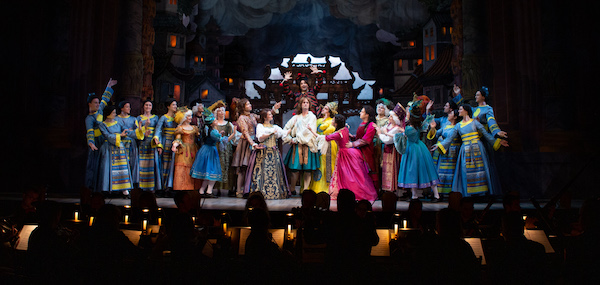Boston Early Music Festival opens 20th season with Steffani’s lavish “Orlando”

Emőke Baráth as Bradamante in Boston Early Music Festival’s production of Steffani’s “Orlando generoso.” Photo: Kathy Wittman
The 20th biennial Boston Early Music Festival opened on Sunday afternoon with the North American premiere of Agostino Steffani’s Orlando generoso at the Emerson Cutler Majestic Theater.
First performed in 1691, Orlando offers something for just about every opera fan: star-crossed lovers, flying beasts, exotic locales, and a good helping of magic, among other things. On top of that, there’s no shortage of virtuosic music.
The opera’s story follows the eponymous hero, though in this telling he’s actually something of a peripheral figure. More central to the plot are a pair of couples, Bradamante and Ruggiero, and Angelica and Medoro.
Through the machinations of the sorcerer Atalante and his henchman Brunello, the former duo are separated: Ruggiero is transported to China where he encounters Angelica, herself searching for the missing Medoro. Thanks to the intervention of the sorceress Melissa, Bradamante turns up in Asia, too, and, when she sees Ruggiero with Angelica, immediately suspects the worst.
Orlando, himself, is enamored with Angelica, though she doesn’t return his feelings. Rather, having fallen in love with Medoro, Angelica wants nothing more than to settle into a quiet life with him. But, when she denies her identity to Orlando and her father, the king Galafro, more complications ensue.
Orlando’s fate is the most drastic. While the other characters suffer from various pangs of jealousy and desires for revenge, Orlando undergoes a complete psychological and emotional breakdown, ultimately ending up in prison.
In the meantime, Atalante constructs an enchanted castle where he holds the lovers captive, though Bradamante, thanks to her mastery of magical arts, defeats him. A deus ex machina (Atalante conceding that his castle/prison was nothing more than an illusion) leads to a happy ending in which the couples are reunited, Orlando’s health is restored, and the virtues of selfless, sacrificial love hymned.
It’s a bewildering and convoluted tale and, clocking in around four hours (including two intermissions totaling around 25 minutes), a long one. Still, Sunday’s performance was well sung and played and proved a musical feast for the ears.
Emőke Baráth sang the role of Bradamante with spirit and energy. Her opening aria, “Un giusto ardir,” was brightly and vigorously articulated. Meanwhile, the sultry urgency of “Inquieta m’aggiro” (with its thrumming Iberian accompaniment) came over directly as did the role’s bravura moments (like Act 3’s “Come Vipera”).
Amanda Forsythe’s Angelica was similarly concentrated and passionate. Whether her character was lamenting the disappearance of Medoro, resisting the advances of her father (who, in a queasy bit, doesn’t recognize Angelica as his daughter), or celebrating her reunification with her beloved, Forsythe sang with pure tone, excellent diction, and true expression.
Among the men, Aaron Sheehan brought impeccable control and brilliant technique to the title role. His introductory “A che ti serve” wanted for nothing in terms of execution and Act 3’s “Miserie fortunate,” in which Orlando finally comes to terms with his obsessive delusions, was pristinely done.
Christopher Lowrey’s Ruggiero and Kacper Szelążek’s Medoro were each smartly etched, both men singing their roles with glowing tone and potent character.
They also blended conspicuously well with their opposites: Medoro and Angelica’s Act 2 reunion duet, for one, was impeccably fused, tonally and expressively.
As Galafro, Flavio Ferri-Benedetti sometimes sounded a bit forced, though his “Che tragiche scene” in Act 3 was beautifully sung.
Jesse Blumberg’s Atalante proved appealingly versatile: sinister in his Act 1 appearances, elegant and suave in Act 2’s “Che bella preda,” and mining the Handelian brio of Act 3’s “Mal concertate moli” with cool charm.
In the smaller roles, Zachary Wilder sang a charismatic Brunello and Teresa Wakim brought silvery tone to Melissa.
The BEMF orchestra delivered an energetic account of Steffani’s score. Like the singers, the ensemble didn’t lack for stamina over the course of the long afternoon. Act 3’s concluding ballet swung with as much rhythmic purpose as did the driving figures of Bradamante’s Act 1 combat with Atalante.
For nuance and tonal shading, too, you could hardly ask for more from this ensemble. From the strikingly varied percussion battery (which included assorted bells, a tambourine, different types of drums, a thunder sheet, and a ratchet) to the keyboards, strummed instruments, and dulcet woodwinds, Sunday’s performance shimmered with discreet colors.
Gilbert Blin’s traditional sets aided the production with efficiency and whimsy. A series of cutouts framed the action: they were either raised or drawn back to reveal the settings of the opera’s many scenes. As a result, most of the afternoon’s activity occurred in a center-stage pathway, though Blin’s stage direction ensured that the dais never felt static or cluttered and certain crucial moments – like Orlando’s recovery of his senses – played out to one side or the other.
Further, Orlando’s aerobatic episodes – highlighted by appearances of Atalante’s Hippogryph (a cross between a horse and an eagle) and Melissa’s floating cloud – added a layer of charm to the proceedings.
Marie-Nathalie Lacoursière’s choreography and Melinda Sullivan’s dance direction brought a dose of 17th-century French spirit to BEMF’s production. And Anna Watkins’ costumes – which included a golden robe for Galafro, a Little Bo Peep-like outfit for Angelica (replete, at one point, with a stuffed sheep), and a jester’s suit for Brunello – ensured a delightful degree of playfulness.
BEMF’s 20th biennial festival continues at various times and locations through June 16. Orlando generoso will be repeated 7 p.m. June 12 and 14 and 3:30 p.m. June 16 at Emerson Cutler Majestic Theater. bemf.org; 617-661-1812
Posted in Performances





